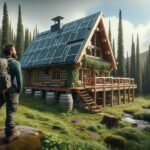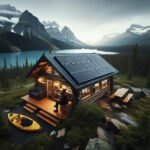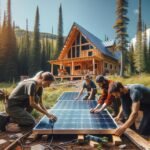Off-grid living often seems like a dream come true, but there’s a hidden reality that many overlook. While the allure of self-sufficiency and a simpler lifestyle is enticing, the challenges can be daunting and, at times, overwhelming. Did you know that nearly 50% of off-grid dwellers report facing significant difficulties in maintaining their energy supply? This statistic raises an important question: are you truly prepared for the sacrifices that come with this lifestyle?
From unreliable power sources to the constant battle against the elements, off-grid living demands much more than just a desire for freedom. Understanding these challenges is crucial if you’re considering this path. Investigate deeper into the complexities of off-grid life to ensure you’re ready for the journey ahead.
The Dark Side Of Off-Grid Living: Challenges You Need To Know
Living off-grid sounds appealing, but the reality can be much tougher. Imagine relying solely on solar panels for life. Sure, renewable energy sources like solar panels promise sustainability, but they come with their own set of hurdles. Are you prepared for potential energy shortages or maintenance issues?
Adapting to a solar lifestyle means keeping up with your energy consumption. On a sunny day, your solar panels may generate adequate power, but cloudy weather can throw a wrench in your plans. This inconsistency can lead to frustrating situations, especially when you’re dependent on electrical appliances.
 How to design your dream off-grid solar cabin on a budget
How to design your dream off-grid solar cabin on a budgetWater supply is another significant concern. When you’re living off-grid, accessing clean water may pose challenges. Consider the logistics of sourcing and storing water. You’ll need reliable systems in place, whether it’s rainwater harvesting or a nearby water body. What happens if your water source dries up or becomes contaminated?
Another often-overlooked aspect is the community. Off-grid living can isolate you from social interactions. You might crave connection, but the lifestyle can sometimes feel lonely. Make a plan for how to maintain relationships, even when living in a remote area.
Finally, don’t forget about costs. While solar solutions promise long-term savings, initial setup fees can be high. Have you accounted for all expenses, like hardware, installation, and potential repairs?
Curious about how solar panels can enhance your off-grid experience? Explore options that fit your lifestyle and empower your energy independence.
Read also: How to design your dream off-grid solar cabin on a budget
How to design your dream off-grid solar cabin on a budget 5 stunning off-grid solar cabin locations in the Canadian wilderness await you
5 stunning off-grid solar cabin locations in the Canadian wilderness await youIsolation And Loneliness
Living off-grid often leads to feelings of isolation and loneliness. The thrill of self-sufficiency and a solar lifestyle might attract many, but reality reveals a stark contrast. When you’re miles away from the nearest neighbor, the silence can feel deafening. You might wonder: how will you cope without regular social interaction?
Psychological Impacts
Isolation doesn’t just impact your social life; it affects mental health, too. Studies indicate that prolonged solitude can lead to anxiety and depression. You may crave human connection, only to find it challenging to maintain relationships when disconnected from the modern world. Imagine relying on solar panels while exploring the emotional toll of being alone. It’s not just about energy supply; it’s about emotional sustainability. How do you recharge your mental batteries when the sun doesn’t shine?
Community Connections
Community plays a vital role in combatting loneliness. Off-grid living doesn’t mean severing ties entirely. The right network can provide support and camaraderie. Engaging with local groups or online forums can help bridge the gap. Whether through shared experiences or solar panel tips, building connections can enhance your journey. Think of it as creating your own tribe in a vast wilderness.
Take the initiative to cultivate relationships, both physically and digitally. Foster connections with others pursuing a solar lifestyle. The joy of shared knowledge about solar energy systems can turn isolation into community. Why not explore forums, join local agricultural or sustainability groups, or attend workshops? You can pave the way for enriching interactions and ensure that your off-grid lifestyle is both fulfilling and connected.
Read also: How to design your dream off-grid solar cabin on a budget
How to design your dream off-grid solar cabin on a budget 5 stunning off-grid solar cabin locations in the Canadian wilderness await you
5 stunning off-grid solar cabin locations in the Canadian wilderness await you How to avoid rookie mistakes when building your wilderness solar retreat today
How to avoid rookie mistakes when building your wilderness solar retreat todayLimited Access To Resources
Off-grid living presents unique challenges, particularly when it comes to resource access. Understanding these can make or break your off-grid experience.
Water and Food Supply
Securing reliable water and food sources remains a primary obstacle. You can’t assume that forever you’ll have access to running water or fresh produce. Off-grid setups often rely on rainwater collection, which can be inconsistent, especially in dry conditions. What’s your backup plan? You may need to store water in large tanks or develop a filtration system. For food, growing your own vegetables is essential, but imagine facing pests or adverse weather. Implementing raised gardens or greenhouses can mitigate these issues and enhance resilience. When you think of a sustainable lifestyle, it’s about creating systems that work together seamlessly, isn’t it?
Medical Care and Emergency Services
Off-grid living often means being far from medical facilities. In emergencies, the distance to healthcare can strain your peace of mind. Can you access urgent care quickly if an accident occurs? You might need to invest in first aid training and supplies, along with a well-stocked medical kit. Consider establishing a communication system—like two-way radios or satellite phones—to reach emergency services when required. Reliable access to essential services can determine the difference between safety and vulnerability. Engaging with local community health resources can also foster connections that enhance this critical aspect of your off-grid journey.
Exploring these challenges doesn’t mean sacrificing quality of life; it’s an opportunity to build a more sustainable and resilient lifestyle. Interested in optimizing your resource access? Explore the innovative solutions on Solar Panels for Life, and learn how solar energy can support a fully self-sufficient off-grid setup.
Read also: How to design your dream off-grid solar cabin on a budget
How to design your dream off-grid solar cabin on a budget 5 stunning off-grid solar cabin locations in the Canadian wilderness await you
5 stunning off-grid solar cabin locations in the Canadian wilderness await you How to avoid rookie mistakes when building your wilderness solar retreat today
How to avoid rookie mistakes when building your wilderness solar retreat today Tips to maintain your solar system in remote Canadian wilderness for better performance
Tips to maintain your solar system in remote Canadian wilderness for better performanceIncreased Dependence On Self-Sufficiency
Off-grid living significantly raises your reliance on self-sufficiency. This lifestyle incorporates essential skills like energy management and resource gathering. Without easy access to utilities, you become the primary provider for your basic needs.
Skills Required
Transitioning to off-grid living demands a diverse skill set. You need to master solar energy management, involving the installation and maintenance of solar panels. What if a panel malfunctions? Can you troubleshoot the issue or replace components? From gardening to hunting, self-sufficiency also relies heavily on agricultural and food preservation techniques. Those engaged in this lifestyle quickly learn the ins and outs of water filtration and storage. Equip yourself with knowledge; it’s essential for thriving in an off-grid environment.
Time Commitment
Off-grid living isn’t a quick fix; it requires substantial time investment. Daily routines shift dramatically. You may spend hours tending to solar panels, ensuring they’re clean and functioning optimally. Can you imagine relying solely on your own energy in unpredictable weather? Harvesting food, maintaining systems, and prepping for emergencies means routine design plays an important role. Building these habits takes time, so prepare to embrace a lifestyle that prioritizes self-sufficiency. Tracking your tasks can streamline processes and make your journey smoother. It’s challenging yet rewarding—consider the sense of accomplishment from living off the land.
Ready to explore solar panels that support your self-sufficient lifestyle? Consider investing in quality solar technology to make off-grid living fulfilling.
Environmental Challenges
Off-grid living presents several environmental challenges, including unpredictable weather patterns and wildlife encounters. Exploring these aspects demands careful consideration and preparation, as they can significantly impact your solar lifestyle.
Weather and Natural Disasters
Weather plays a crucial role in off-grid living, especially for your energy production. You rely heavily on solar panels, but inconsistent sunlight during cloudy days or storms directly affects energy generation. What happens when you run out of power during a crucial moment? Planning for these fluctuations is essential.
Consider the reality of natural disasters. Severe storms, wildfires, or floods can damage your solar panels or disrupt your water supply. It’s wise to invest in robust, reliable solar solutions that can withstand harsh conditions. Ensure you have backup systems—like generators or batteries—to maintain power when the sun isn’t shining. By prepping adequately, you enhance your resilience, making your off-grid experience more manageable and secure.
Wildlife Encounters
Living off-grid often means closer proximity to nature, which includes wildlife encounters. You might find yourself sharing your environment with various animals, from curious raccoons to deer. While they can be a joy to witness, they may also pose risks.
Imagine waking up to find that a raccoon has knocked over your food supplies or that deer have raided your garden. These scenarios highlight the importance of protective strategies. Secure your food sources, use fences for gardens, and learn about local wildlife behavior. Understand how to coexist with nature while safeguarding your resources.
You embrace a unique lifestyle, but it requires vigilance and adaptability. With the right mindset and preparation, you can thrive in harmony with nature. If you’re curious about enhancing your off-grid setup, explore durable solar panels designed for life in diverse conditions to support your journey.
Conclusion
Embracing off-grid living can be a rewarding adventure but it’s essential to face the challenges head-on. From energy management to securing clean water and maintaining social connections, each aspect requires careful consideration. You’ll need to develop skills and strategies to navigate the complexities that come with self-sufficiency.
Understanding the potential downsides will prepare you for the realities of this lifestyle. It’s crucial to build a support network and stay informed about the resources available to you. By approaching off-grid living with a vigilant and adaptable mindset, you can create a fulfilling experience that aligns with your values while overcoming the obstacles along the way.
